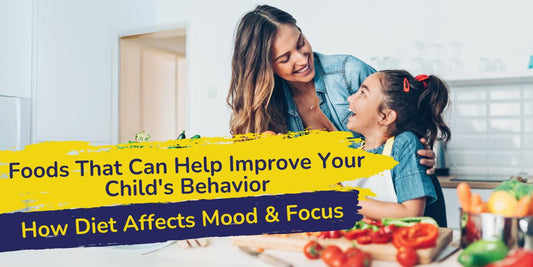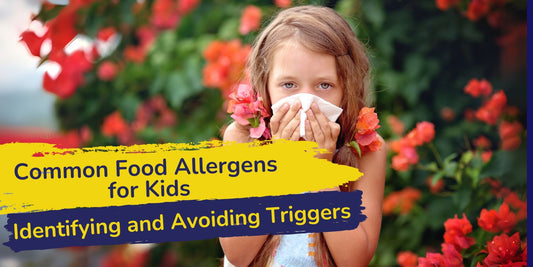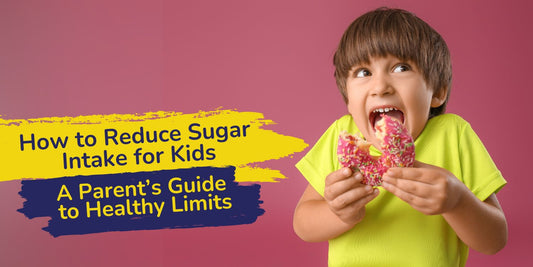
15 Common Symptoms of IBS in Kids You Should Know
Imagine your child frequently clutching their stomach, skipping meals, or rushing to the bathroom without warning. You might dismiss it as a tummy bug or stress from school, but it could be something more—Irritable Bowel Syndrome (IBS). While IBS is often associated with adults, it affects up to 6% of children worldwide and can significantly disrupt their daily life (source).
IBS is a chronic gastrointestinal condition that can be confusing and frustrating for both parents and children. Recognizing its symptoms early is crucial to ensure proper management, reduce discomfort, and improve your child's quality of life.
What is IBS?
Irritable Bowel Syndrome (IBS) is a long-term disorder that affects the large intestine. It causes the digestive system to behave abnormally, leading to a variety of gastrointestinal symptoms, without any structural damage visible in medical tests.
Unlike a stomach infection or food allergy, IBS is a functional disorder, meaning the bowel looks normal but doesn’t work as it should. Its most common symptoms include abdominal pain, bloating, gas, and irregular bowel movements like diarrhea or constipation.
10 Symptoms of IBS in Children
Here are ten signs to watch for, each shedding light on how IBS can impact a child’s life:
1. Abdominal Pain or Cramps

Abdominal pain is the most frequently reported and often the earliest sign of IBS in children. This pain is usually located around the belly button or lower abdomen and may vary from a dull ache to sharp cramps. It often intensifies after meals and may ease after a bowel movement. Triggers include emotional stress, overeating, consumption of high-fat or spicy foods, or even changes in routine. Children may find it hard to express the discomfort, leading to irritability, school refusal, or sleep disturbances.
2. Changes in Bowel Habits
(Diarrhea, Constipation, or Alternating)
IBS in children often shows up as irregular bowel movements. Some children may experience diarrhea, with frequent, urgent trips to the bathroom, while others may suffer from constipation, where passing stool becomes painful and infrequent.
In many cases, the two alternate unpredictably. These shifts are usually due to dietary sensitivities (like lactose or gluten), lack of fiber, or gut-brain axis imbalances. These unpredictable patterns can cause stress, embarrassment, and even fear around eating or using public restrooms.
3. Bloating or a Feeling of Fullness
Children with IBS often report that their stomach feels “tight” or “puffy,” especially after meals. This bloating is caused by the accumulation of gas in the intestines, either from slow digestion, gut bacteria imbalance, or fermentation of certain carbohydrates like those found in beans or wheat. Even if a child has only eaten a small portion, they may feel too full to eat more, potentially affecting their nutrition and overall mood.
4. Excessive Gas

Passing gas more than usual—or holding it in due to embarrassment—is another hallmark of IBS. This symptom results from fermentation of undigested food, especially foods rich in FODMAPs (a group of hard-to-digest carbs), and incomplete digestion. The odor and frequency can be distressing, leading to social anxiety or avoidance of meals altogether, especially in public or school settings.
5. Urgency (Sudden and Strong Need for a Bowel Movement)

This symptom can be particularly stressful for children. The urgent need to defecate can strike suddenly, often accompanied by cramping. Children may fear not making it to the toilet in time, causing distress at school, during travel, or while playing. Triggers include stressful situations, eating fatty foods, or sudden changes in gut motility. This can lead to bathroom-related anxiety and even stool withholding behaviors
6. Mucus in Stool

While typically not dangerous, mucus in the stool can be concerning to both children and parents. It appears as a jelly-like substance and often accompanies other IBS symptoms like loose stools or constipation. This occurs due to inflammation or irritation in the colon, which may be triggered by stress, food intolerance, or gut microbial imbalances. Though not usually a sign of infection, persistent mucus should still be monitored by a doctor.
7. Nausea

Some children with IBS frequently feel nauseous, especially in the mornings or after eating. This can stem from delayed gastric emptying, where the stomach empties slower than normal, or from psychological stress, which affects gut function. Nausea may reduce a child's appetite and interest in meals, leading to poor nutrition or even weight loss over time if not addressed.
8. Feeling of Incomplete Evacuation
This is when a child feels like they haven’t completely emptied their bowels, even after going to the toilet. It's caused by discoordination in intestinal muscle contractions, which makes stool passage inefficient. Children may keep returning to the bathroom or spend long periods sitting uncomfortably. This feeling can also create anxiety, disrupt concentration, and affect school or social life.
9. Fatigue
Fatigue in children with IBS can be both physical and emotional. Digestive discomfort may interfere with sleep, and dietary restrictions or malabsorption may lead to nutrient deficiencies. Moreover, constant pain, the stress of managing symptoms, and poor coping strategies can leave children mentally drained. This can impact their ability to engage in play, academics, or even simple conversations during the day.
10. Headaches
Although seemingly unrelated to the gut, headaches are quite common in children with IBS due to the gut-brain connection. Ongoing abdominal pain, anxiety, and poor sleep can lead to tension headaches or even migraines. Inflammatory responses from the gut can also contribute. This adds to the child’s overall discomfort and may further reduce their ability to participate in school or play.
Management and Treatment
Dietary Changes
One of the most effective ways to manage IBS in children is through diet. A low-FODMAP diet—which limits certain fermentable carbohydrates—can significantly reduce symptoms like bloating, gas, and abdominal pain. FODMAPs are found in foods like dairy, wheat, apples, and beans, and they can be difficult for some kids to digest.
Alternatively, increasing fiber intake (especially soluble fiber from fruits, vegetables, and oats) can help regulate bowel movements and relieve both constipation and diarrhea. However, dietary changes should always be made under the guidance of a pediatric dietitian to ensure balanced nutrition.
[Source: https://pmc.ncbi.nlm.nih.gov/articles/PMC10346910/]
Stress Management Techniques
Stress and anxiety are powerful triggers for IBS symptoms in children, so helping your child manage emotional well-being is crucial. Techniques like deep breathing, guided imagery, and mindfulness activities can calm the nervous system and improve gut function.
For younger children, play therapy and art-based methods allow emotional expression in a safe and comforting way. Regular routines, reduced pressure at school, and open family communication can also reduce stress-related flare-ups and foster emotional resilience.
Medications
While lifestyle and dietary changes are the first line of treatment, medications may be necessary if symptoms are severe or persistent. A pediatrician might prescribe antispasmodics to relieve abdominal cramping, laxatives for chronic constipation, or anti-diarrheal medications for children dealing with frequent loose stools.
It's essential that all medications be prescribed and monitored by a doctor to ensure safety and effectiveness, especially since responses can vary widely between children.
Probiotics and Other Therapies
Emerging research suggests that certain probiotic strains—live beneficial bacteria—can help restore balance to the gut microbiome and improve IBS symptoms in some children. Strains like Lactobacillus and Bifidobacterium have shown promise in reducing gas, bloating, and irregular bowel movements.
Additionally, therapies such as acupuncture, yoga, or even cognitive behavioral therapy (CBT) may offer relief when combined with medical treatment. As always, these should be evidence-based approaches discussed with a healthcare provider.
[Source: https://pmc.ncbi.nlm.nih.gov/articles/PMC11597149/]
When to Seek Medical Advice
Certain red flags should not be ignored: weight loss, blood in stool, persistent vomiting, or extreme fatigue. These may indicate a more serious condition like inflammatory bowel disease or celiac disease.
Always maintain regular follow-ups with your pediatrician or a pediatric gastroenterologist, especially when symptoms change or worsen.
Conclusion
IBS in children may sound overwhelming, but with the right tools and awareness, it’s manageable. Recognizing these symptoms early allows for effective intervention, reducing your child’s discomfort and improving their day-to-day life.
With proper care, children with IBS can lead vibrant, happy lives. If your child is showing any of these signs, consult a healthcare professional and explore strategies that work best for your family.
Stay informed, stay empathetic—and most of all, trust your instincts.






